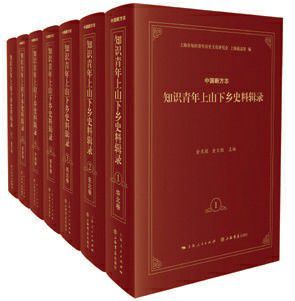Landmark study of China’s ‘educated youth’

New Chinese Local Records: A Compilation of Historical Materials on Educated Youth
Editor: Jin Guangyao, Jin Dalu
Publisher: Shanghai People’s Publishing House, Shanghai Bookstore Publishing House
In the late 1960s, millions of zhiqing, a Chinese term that translates to “educated youth,” went “up to mountains and down to villages” to learn from farmers. This mass excursion of students to the countryside is considered a pivotal part of the nation’s history.
The six-volume New Chinese Local Records: A Compilation of Historical Materials on Educated Youth, containing 6.8 million Chinese characters, is regarded as a landmark study of zhiqing.
More than 50 educated youth volunteers spent four years categorizing and editing more than 6,000 kinds of newly compiled local records collected from 29 provinces, municipalities and autonomous regions across the country as well as the Xinjiang Production and Construction Corps.
As renowned scholar Shen Guoming said in the preface: “The publication fulfills its preset goal of including all sorts of local records.”
The book is divided into six volumes according to administrative region, namely the north, northeast, northwest, east, south and southwest China. Covering the period from 1955 to 1980, it examines the complete history of this social phenomenon that involved around 17 million young Chinese. It also includes the policies for resettling dispatched youth after their return to their urban homes.
Though the compilation is categorized by administrative region, it demonstrates a distinct tendency toward thematic compilation that is common in contemporary history studies. A variety of themes, such as settlement funds, mobilization policy and youth marriage, are dicussed, setting a disciplinary framework for the study.
While the study of zhiqing has generated a number of results, it is still in a relatively early stage. Therefore, the volumes are of vital significance because they demonstrate that the study can be conducted from a historical perspective while it can also be examined from the standpoint of sociology, cultural studies, education, political science, statistics, art, law and economics.
Yang Jianlong is the director of the Urban Culture Research Center at Shanghai Normal University.
